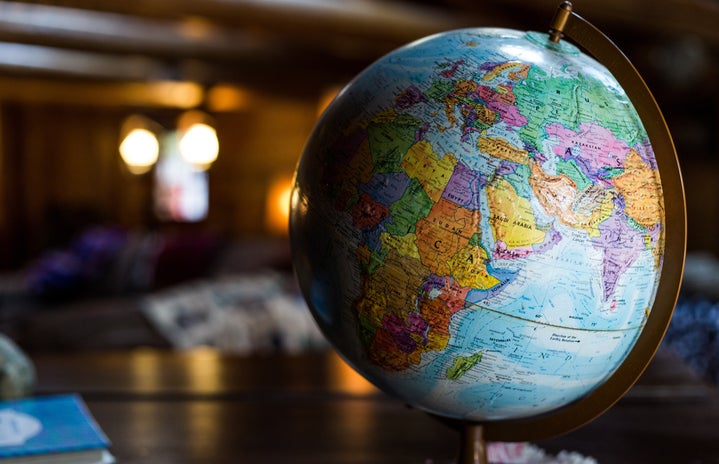The TCK isn’t a relatively new phenomenon. It has been around since the 1950s. We may attribute its rise in popularity to the advent of social media–allowing this community to become more accessible to others in search of similar individuals. The term “Third Culture Kid” (TCK) was coined by the American sociologist Ruth Usee in the 1950s and describes a child who:
“…has spent a significant part of their formative years outside their parents’ culture. People who fit that bill have a tendency to mix and merge their birth culture with their adopted culture, creating one of their own: a third culture.” (The Guardian)
Being a TCK involves this struggle to fit in with a singular culture as they have been immersed in more than one. They may have a hard time identifying with the culture through which they were born–unlike the natural affinity, others would have endured having spent longer within a particular culture. They may even have moved around to different countries constantly.
As a TCK, I can testify to the immediate internal struggle when someone asks where I would call home. Constantly moving around and being surrounded by an array of cultures makes it harder for us to possess a singular identity, but we still encounter homesickness, and as usual, we find unique ways to cope and make our unique situations work.
To gain better insight on how varying TCKs handle their homesickness, I interviewed four friends I met around the time I moved to London, three of whom I met thanks to TCKGlobal’s Discord and Instagram!
LAURA:
Born in Colombia as an only child, Laura had moved between Panama, India, Colombia, and El Salvador and spent her formative years/teens in Malaysia. Now based in both Switzerland and London, she encounters a different form of culture shock taking shape through rules and societal manners differing greatly from what Laura had been accustomed to. She found London’s internationality particularly comforting. When I asked her how she copes with missing Malaysia as one example, her answer was simple:
“If not cooking, then just finding it…it doesn’t even have to be Malaysian food, but because..in Malaysia, there was so much Chinese food…Korean… It would remind me of me and my friends going to Korean barbeque…Asian supermarkets, buy my childhood snacks there…sit down, and watch my Korean dramas… It’s very comforting for me…it’s what I did in Malaysia..building that little bubble for myself of the stuff from back then.”
Chiara:
Born to a German father and a Filipino mother, with a younger sister, Chiara grew up in Hong Kong, The Philippines, and Germany. She describes spending her formative years in Hong Kong from age 11-15 and from 15 onwards in Germany. Adapting to high school in Germany for Chiara was a challenge. Most often, for her, it felt like a step backward, without the digital or sports or after-school activities. Fitting in was a struggle, and she felt unmotivated. Therapy helped Chiara develop coping mechanisms and work through her emotions. It even posed as guidance when her parents weren’t around. Even more, Chiara channels her homesickness through her hobbies:
“In dance, I started meeting…people who were half-something–people who were born in different countries–they were more open. Our line of performing…you get to travel a lot, you meet people from other countries, you compete with other countries–they’re more open-minded–that’s when I began to build my footing in Germany….still my friends today. Even watching shows that I used to watch as a kid…MTV shows, like Jersey Shore… every time I miss certain aspects of home, I would watch those old reality tv shows from the 2000s.”
Jordan:
Jordan moved from Namibia, Kenya, France, Ghana, Switzerland, and Tunisia, as a child before settling in the UK, where he currently resides. Jordan describes his family as blended. A Kenyan father, a Namibian mother, a French stepdad, and eight siblings in total. Growing up with parents who hold such diplomatic jobs calling for countless moves, Jordan found another solace:
“Aside from food, music is my number one way of dealing with homesickness. Our household listened to tons of music. Every time we moved to another country, they’d listen to music from the country, events, and arts of the country cuz they loved it. So for me, I cope with music because it’s easy to access. I feel cradled by art and music…safe and not scared, nostalgia is there but not painful as much anymore.”
Dan:
Coming from a Vietnamese background, Dan grew up most of his life in Indonesia, then Michigan–later moving to Switzerland, Florida, and back to Asia (Malaysia, Indonesia), then Poland, where he now lives. Facing an array of cultures, from attending an international school and experiencing one culture in the home and another outside, or even what Dan deemed the ‘average American experience,’ carried its challenges. For Dan, coping with homesickness solidified through friendship and acceptance, even watching food bloggers.
“Reconnect with people sharing the same experiences…being aware of your feelings, giving yourself space to feel them, and dealing with it. The more places that you move to…the more places you miss… Learn that you’re allowed to feel it… You left for a reason. Prepare for your nostalgia to get a little overboard, and remind yourself that it’s not that easy. Also, Asia…has a million food bloggers, so if you’re missing these things… They will walk around the streets and try different foods…you’ll be like, “Hey! That’s connecting a little bit with home!” You’ll hear the language as it is spoken on the streets, you’ll see the food, you’ll see the streets…how things are…my Instagram is filled with food bloggers…like 60% of what I have on my Instagram feed are Asian food bloggers.”
Interviewing these 4 TCKs sheds light on how similar yet different our understandings and cures to homesickness can be. There seems to be a particular attachment we feel as TCKs during our formative years to certain countries. Maybe it’s tied to this unique point in life as teenagers where we thrive more in social spheres and are in the middle of finding our place in this world. It was even quite amusing to hear how out of the four TCKs I spoke to, there was a general consensus among the three of how London really helped them feel more at home despite not having spent time there as children. The city carries a uniquely international aura that helps them feel like they’re not alone and can bond with others of similar backgrounds, other TCKS!
These interviews enabled me to reflect on how I cope with my own bouts of homesickness. Music played a primary role. It could be playing my favorite song, “San Francisco” by Scott McKenzie, keeping up-to-date with the San Francisco Chronicle, or watching my favorite Youtubers based in Hong Kong, or TCKs. Another go-to would be visiting Chinatown Bakery in Chinatown, and grabbing my childhood favorites, like the Hong Kong-style milk tea, and cocktail or pineapple buns.
Being a TCK is no easy feat, but it only shows how unique we are. We learn to adapt quickly to new environments. We find ways to tie our individual passions and memories together—to those cultures we miss. They expose and bring us back to our nostalgia.


